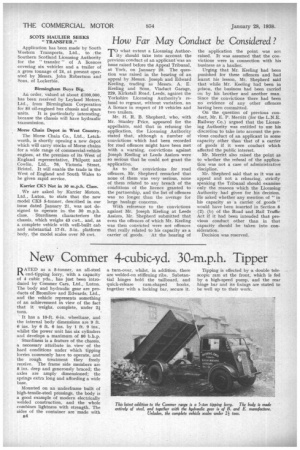How Far May Conduct be Considered?
Page 8

If you've noticed an error in this article please click here to report it so we can fix it.
what extent a Licensing Author
ity should take into account the previous conduct of an applicant was an issue raised before the Appeal Tribunal, at York, on January 20. The question was raised in the hearing of an appeal by Messrs. Joseph and Edward Keeling, trading as Messrs. A. E. Keeling and Sons, Viaduct Garage, 229, Hirkstall Road, Leeds, against the Yorkshire Licensing Authority's refusal to regrant, without variation, an A licence in respect of 10 vehicles and two trailers.
Mr. H. R. B. Shepherd, who, with Mr. Stanley Price, appeared for the appellants, said that in refusing the application, the Licensing Authority stated that, although a number of convictions which had been recorded for road offences might have been met with a warning, convictions against Joseph Keeling at Leeds Assizes were so serious that he could not grant the application.
As to the convictions for road offences, Mr. Shepherd remarked that none of them was very serious, none of them related to any breach of the conditions of the licence granted to the partnership, and the list of offences was no longer than the average for large haulage concerns.
With reference to the convictions against Mr. Joseph Keeling at Leeds Assizes, Mr. Shepherd submitted that even the offences of which Mr. Keeling was then convicted were not offences that really related to his capacity as a carrier of goods. At the hearing of the application the point was not raised. It was assumed that the convictions were in connection with his business as a haulier.
Urging that Mr. Keeling had been punished for these offences and had learnt his lesson, Mr. Shepherd said that while Mr. Keeling had been in prison, the business had been carried on by his brother and another man. Since the convictions there had been no evidence of any other offences having been Committed.
On the question of previous conduct, Mr. E. P. Merritt (for the L.N.E. Railway Co.) argued that the Licensing Authority was entitled to use his discretion to take into account the previous conduct of an applicant in some capacity other than that of a carrier of goods if it were conduct which affected the public interest.
Mr. Merritt also raised the point as to whether the refusal of the application was not a case of administrative Mr. Shepherd said that as it was an appeal and not a rehearing, strictly speaking the Tribunal should examine only the reasons which the Licensing Authority had given for his decision. He asked whether any mention of "in his capacity as a carrier of goods " would have been inserted in Section 6 (2) (b) of the Road and Rail Traffic Act if it had been intended that previous conduct other than in that capacity should be taken into consideration.
Decision was reserved.
































